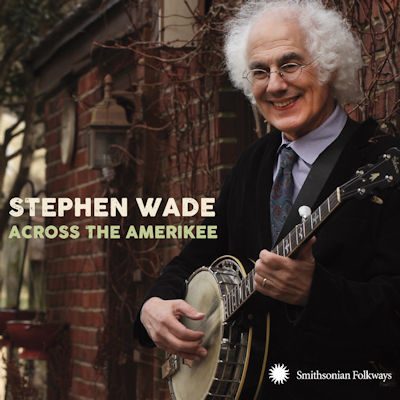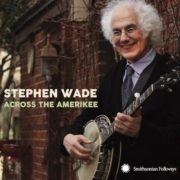STEPHEN WADE – ACROSS THE AMERIKEE
TITLE: ACROSS THE AMERIKEE: SHOWPIECES FROM COAL CAMP TO CATTLE TRAIL
ARTIST: STEPHEN WADE
LABEL: SMITHSONIAN FOLKWAYS
RELEASE DATE: JUNE 30, 2017
Pure Perfection
 Remove one word from the title—Across the Amerikee: Showpieces from Coal Camp to Cattle Trail—and any old folkie with a banjo and guitar could have made this record. Just take out the word “Showpieces” and I could have made it. But Stephen Wade and only Stephen Wade could have made it with that stop the show word right in the middle of it. Every track on the album would have been the highlight of any other performer’s record. As it stands, you’ll have to decide for yourself which takes your breath away more—the sparkling banjo pieces on the Gibson closed back bluegrass banjo, the dumbfounding eye-catching bass-heavy fretless open back frailing banjo that represents the very best of old-time minstrel-show traditional playing; or the wild rippling finger-style guitar playing of the cowboy ballads—some of which you have never heard before, even if you recognize the titles—or the amazing storytelling of a raconteur who has maintained spellbound audiences for record runs from Chicago to Washington, DC. This is a record you will come back to again and again, depending on your mood, and an ideal travel companion—for with this in your CD player on the road you are guaranteed never to fall asleep at the wheel. It’s a flat-out certified gold standard American classic—62 minutes of a joyful noise unto the Lord—and anyone else who may be listening.
Remove one word from the title—Across the Amerikee: Showpieces from Coal Camp to Cattle Trail—and any old folkie with a banjo and guitar could have made this record. Just take out the word “Showpieces” and I could have made it. But Stephen Wade and only Stephen Wade could have made it with that stop the show word right in the middle of it. Every track on the album would have been the highlight of any other performer’s record. As it stands, you’ll have to decide for yourself which takes your breath away more—the sparkling banjo pieces on the Gibson closed back bluegrass banjo, the dumbfounding eye-catching bass-heavy fretless open back frailing banjo that represents the very best of old-time minstrel-show traditional playing; or the wild rippling finger-style guitar playing of the cowboy ballads—some of which you have never heard before, even if you recognize the titles—or the amazing storytelling of a raconteur who has maintained spellbound audiences for record runs from Chicago to Washington, DC. This is a record you will come back to again and again, depending on your mood, and an ideal travel companion—for with this in your CD player on the road you are guaranteed never to fall asleep at the wheel. It’s a flat-out certified gold standard American classic—62 minutes of a joyful noise unto the Lord—and anyone else who may be listening.
It’s the perfect follow-up to Stephen Wade’s last album—the one I reviewed a few years ago—Banjo Diary—which also introduced you to this incomparable artist whom I met in Chicago when I was teaching English in a Catholic girls high school—my last teaching job before leaving academia to become a full-time folk singer. Here is the link to that review.
And before that, in 1997, was the Rounder Records collection he culled from the Library of Congress Folk Music Archives—started by Robert Winslow Gordon in 1928 and sustained and made available to scholars and performers alike by Alan Lomax— A Treasury of Library of Congress Field Recordings. Stephen Wade is both, and he created the most extensive single album introduction to the Archives of all—the best of the best in all genres of American folk music. It’s a Treasury of American Folk Music unto itself. No one has spent more time buried in them than Wade, and no one has absorbed them more. Those are the great folk artists Stephen Wade has learned from, and whose banner and torch he carries on in his own performances. Based on this seminal recording Stephen Wade then authored his 504-page magnificent book The Beautiful Music All Around Us: Field Recordings and the American Experience (with companion CD) in the University of Illinois Press Music in American Life Series—his one-volume introduction to the field of American Folk, published in August, 2012, recipient of the ASCAP Deems Taylor award and the Association for Recording Sound Recordings (ARSC) award for Best History in the category of Folk, Ethnic, or World Music. It’s a masterpiece.
In this new CD Wade brings to bear his many talents—as folk song collector, performer and author. The liner notes to this album are extensive, informative, entertaining and reliable. They are worth the price of the album, just to learn the history and sources of each song. To be able to hear them as well is like an extraordinary gift added on. It’s worth at least two Grammys—one for the performances and two for the encyclopedic introductions to each one. This is what made Folkways old LPs so valuable—the booklets inside each record jacket were like a living classroom in the field of folk music.
Smithsonian Folkways has carried on this legacy of Moses Asch with dedication and loyalty. This is literally your record label—the American public’s own music and you owe it to yourself to support it. In the hands of Stephen Wade it is American music at its best—going back generations and representing the efforts of folklorists like John Lomax, Alan Lomax, Bess Lomax Hawes and Moe Asch all the way back to songcatchers like Carl Sandburg, Helen Creighton, Frank Proffitt, John Jacob Niles, Cecil Sharp and Maud Karpeles. These were all collectors who got their shoes dirty traipsing through backwoods and mountain passes to track down perhaps one song from the only person who knew it. That’s how Sandburg found the one verse cowboy lyric Colorado Trail; that’s how Alan Lomax found Dink’s Song, If I had wings like Noah’s dove; and Pete Steele’s 1’34” banjo instrumental Coal Creek March.
Collections like these are priceless, and many of them are now to be found in the Library of Congress Folk Music Archives. Stephen Wade is a national treasure to have in turn made them available to us.
All of this consummate music grew out of his Chicago hit show I first heard in 1979: “Banjo Dancing: The 48th Annual Squitters Mountain Song Dance Folklore Convention and Banjo Contest…and How I Lost” which made its way to Broadway and Washington, DC, where it set records for longest-running show in town. I wish someone would bring it to Los Angeles’ Ahmanson Theatre. LA would flock to see it.
But it’s possible that Stephen Wade has moved on. His new Smithsonian Folkways draws from various kinds of performance he first perfected for Banjo Dancing and it lends itself to studio recordings as well as live theatre—virtuoso banjo instrumentals, guitar accompaniment of folk songs that deliberately range “Across the Amerikee” from sea to shining sea, from “the redwood forest to the Gulf stream waters,” and most reminiscent of his one-man play an extraordinary story-telling piece that creates a rough-hewn backwoods unforgettable character from the fields and hollers of the American landscape, a cynic known as Hard Head Hardy, who refuses to believe that the railroad will ever be built in this country. His unwillingness to accept the reality of what is transpiring before his very eyes shows how deeply conservative real folklore can often be—quite the contrary to Pete Seeger’s masquerade of progressive values supporting social change in all of its forward-thinking bound for glory momentum. But despite its exaggerated clinging to a past that is already beyond the horizon it’s funny as hell. Stephen Wade has inherited the mantle of the great American storyteller left when U. Utah Phillips joined the great Wobblies in the sky like Joe Hill and Haywire “Mac” McClintock. And he is a great musician to boot, who carries on the best songs and “showpieces” of “Uncle” Dave Macon and the New Lost City Rambler’s Tom Paley.
But Stephen Wade, above all, is a musician of impeccable taste—all is not dazzle and flash here; he can play a moving and beautifully-nuanced song like Swing and Turn Jubilee on one track, and an uplifting dance tune like Fly Around My Pretty Little Miss on the next. The album is wonderful precisely because it fulfills Samuel Taylor Coleridge’s definition of great art: “The whole is greater than the sum of its parts.”
Put Stephen Wade on your top shelf—that five-feet of space reserved for only the very best—with Mike and Peggy Seeger, Charlie Poole, Fleming Brown, Hobart Smith, Doc Boggs, Doc Hopkins, Wade Ward and Uncle Dave Macon. They will be happy to move over and make room for this Chicago wunderkind. From Squitter’s Mountain to folk hero—he’s the real thing. Stephen Wade is the reason Gibson makes banjos.
Track Listing
Wild Horse
Come On Buddie, Don’t You Want To Go
Chesley Chancey’s Cumberland Gap
Swing and Turn, Jubilee
Fly Around My Pretty Little Miss
Diamond Joe
Puncheon Camps
Hard Head Hardy
KC Whistle
Willie Moore
Uncle Dave’s Fandango
Goodbye, Old Paint
Tom Paley’s John Henry
Trouble at the Coal Creek Mines
Gray Eagle
Lost John
Shortenin’ Bread
Reno Factory / Brown Skin Blues
Sourwood Mountain
In the Pines
Cherry Blossom Waltz
“Grassroots singers and players throughout the United States have long cultivated their own varieties of recital music. A simple dance tune transforms into a concert masterpiece; a personal plaint becomes emblematic of an era. With banjo and occasional guitar, Stephen Wade explores this music made for music’s sake. His selections draw from Southern sources as well as Northern interpreters, centering on lyric folksong and old-time instrumentals transmitted, as one of its older players memorably said, “across the Amerikee.” 62 minutes, 44-page booklet with extensive notes.”
Folk singer Ross Altman has a PhD in Modern Literature from SUNY-Binghamton; Ross belongs to Local 47 (AFM); he may be reached at greygoosemusic@aol.com













